14 Best Books About Norway & Norwegian Books To Read Now
This post may contain affiliate links that earn us a commission at no extra cost to you.
What are fantastic Norwegian books to add to your TBR pile? Uncover the best books about Norway to read before you go.
From serial killers to philosophy, what books on Norway should you read before you go? We remember Norway books like Sophie’s World from our high school philosophy class. Who are you?
You’ll find themes of finding oneself and self-growth throughout our books set in Norway reading list.
And although problematic and Eurocentric, Kon-Tiki is still an important Norwegian book. In fact, the title even influenced TUL contributor, Dagney, to study anthropology.
Then, uncover some of the best books about Norway for WWII buffs — especially if you enjoy survival stories — and Norwegian novels for mystery and crime lovers.
Encounter an island full of strong women, and reflect on the ice palaces across Norway.
Below, we are sharing endless translated Norwegian books for every type of reader, both fiction and nonfiction. We hope that these books set in Norway will not only transport you there but teach you more to enhance your trip.
So, what books should you read before traveling to Norway? Which novels about Norway do we recommend? Let’s get started!
Don’t miss these great Norwegian movies too!
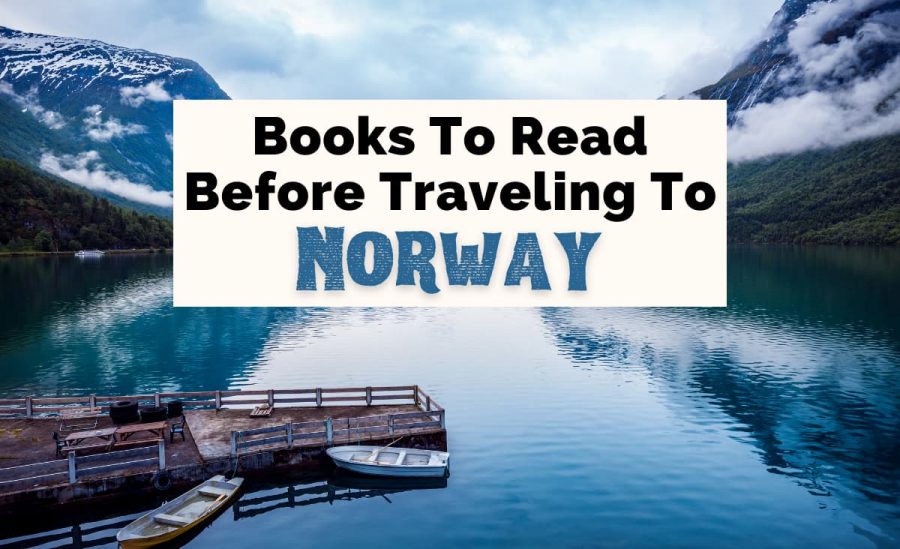
Grab these Norway books here:
- Audible Plus: From Amazon, listen to Amazon Originals, podcasts, and audiobooks. They add new titles every week.
- Book of the Month: Get the month’s hottest new and upcoming titles from Book of the Month. You might snag an early release or debut author. Along with selecting a book a month, find terrific add-ons, both trendy and lesser-known titles.
- Amazon Prime Video – Stream thousands of ad-free movies and TV series on demand with Prime Video.
14 Best Books About Norway
By Dagney McKinney
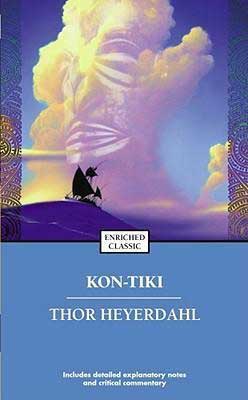
1. Kon-Tiki by Thor Heyerdahl, translated by F. H. Lyon
Named after an old name for the Inca god Viracocha, Kon-Tiki is the name given to the raft on which author and explorer Thor Heyerdahl and his crew traveled from Peru to the French Polynesian Tuamoto Islands in 1947.
Heyerdahl chose to make the perilous journey in order to prove that people from South America could have made the journey in pre-Columbian times and that long-distance travel via water was possible for ancient civilizations.
To do this, he constructed the eponymous raft out of local materials and by using only technologies that existed in those times. And with a few modern items, such as a radio and some charts, he and his crew set off into the ocean to prove it could be done.
Heyerdahl serves as the narrator for this book. It should be noted that he is very much of his time – some of the descriptions of the Peruvians and of the Polynesians are extremely problematic. The book as a whole is very Eurocentric.
However, as a part-Norwegian myself, I can’t deny that this book was important to me growing up. While I do not share Heyerdahl’s backwards opinions, it greatly influenced my decision to study anthropology later in life.
Technically this one is cheating as it isn’t really about Norway, but it’s one of the most important Norwegian books; you’ll find a copy in nearly every household. Amazon | Goodreads
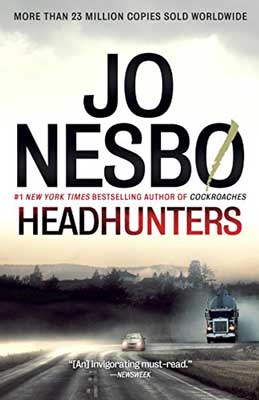
2. Headhunters by Jo Nesbø, translated by Don Bartlett
Roger Brown is the best headhunter there is. If you want someone to work for you, Roger will get them on your team. His wife owns a gallery, and their apartment is amazing. Everything’s going great.
But Roger’s lavish lifestyle isn’t supported entirely by his day job; in his spare time, he and his partner Ove rob prospective clients of expensive works of art to sell on the black market.
When one comes along who may in fact have one of the most expensive and sought-after paintings of the modern art world, Roger plans the heist to end all heists which, if successful, will set him up for life.
But this new client is not what he seems, and suddenly Roger is on the back foot … and on the run. With seemingly no one to trust and no help in sight, Roger must find a way to use his wits and escape the reckoning that’s been a long time coming.
A thriller through and through, this was the first Jo Nesbø book I ever read. It’s a great introduction to the author if the idea of reading an entire detective series of novels set in Norway feels too daunting.
But if you enjoy it, try out Nesbø’s most famous books, the Harry Hole series which starts with The Bat. Amazon | Goodreads
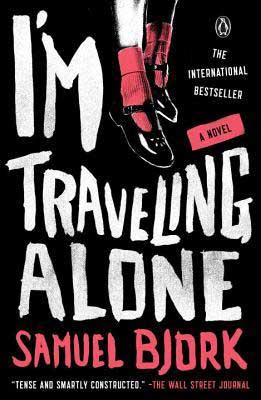
3. I’m Traveling Alone by Samuel Bjørk, translated by Charlotte Barslund
When a six-year-old girl is found hanging lifeless from a tree in the Norwegian countryside, it’s immediately evident that this is no ordinary crime.
First, the girl is strangely dressed in unusual, doll-like clothes. Second, there’s a sign around her neck that says “I’m traveling alone”.
Veteran inspector Holger Munch wastes no time in contacting the troubled yet brilliant investigator Mia Kruger. Mia has been living on an isolated island and dealing with the ghosts of her past.
Once she sees a photograph from the crime scene depicting the number “1” engraved in the murdered girl’s nail, however, she knows that this is not the work of a one-time criminal, but of a serial killer.
I’m Travelling Alone is more than just another police procedural, although fans of that genre will have plenty to enjoy here.
The complex narrative and fully fleshed-out characters make this Norway book one to relish, as each subplot comes together to create a novel that is more than the sum of its parts. Amazon | Goodreads
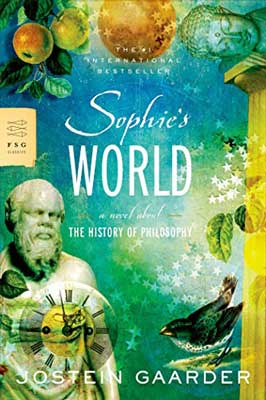
4. Sophie’s World by Jostein Gaarder, translated Paulette Møller
Sophie Amundsen is an ordinary 14-year-old girl living in the town of Lillesand in Norway. One day, she returns home to find two notes in her mailbox – the first says “Who are you?” and the second says “Where does the world come from?.” There is also a postcard, addressed to a girl named Hilde.
If you have questions about these events, don’t worry: you’re not the only one. Sophie wants to know just what on Earth is going on, too.
She enlists the help of her friend Alberto. Together, they embark on an odyssey of philosophy, as they learn to try and decrypt the universe itself in their quest for understanding.
This Norway book is incredibly cerebral. If you’re looking for something that will fry your brain a little, this is the next TBR for you.
Although Sophie’s World might seem like one of the more highbrow books on Norway, it’s actually written for kids and young adults; it’s a fun, easy entry into philosophy for everyone. In fact, I read it and loved it as a kid! Amazon | Goodreads
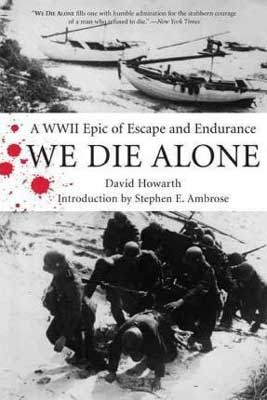
5. We Die Alone by David Howarth
The events of We Die Alone are so extraordinary, it would be easy to believe it was fiction. But that is not the case – the events in David Howarth’s telling of Jan Baalsrud’s World War 2 escapades are part of a true story of wartime survival.
On a mission to secretly enter Nazi-occupied northern Norway by boat, Baalsrud is betrayed and forced to fight his way out of capture and into the freezing wilderness of an island above the Arctic Circle.
With the Nazis just a few hundred yards behind, and leaving a trail of blood that would be easy to follow, Baalsrud must find a way to survive both the possibility of recapture and also of freezing to death in subzero temperatures.
We Die Alone has plenty of twists and a lot of tense moments. I read a lot of survival books, and I can definitively say that this is one of the better ones.
Not only that, but it’s also one of the best books about Norway set during WWII. Amazon | Goodreads
Do you enjoy WW2 books? Don’t miss our favorite World War 2 books of all time.
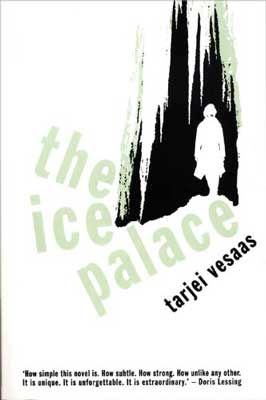
6. The Ice Palace by Tarjei Vesaas, translated by Elizabeth Rokkan
When the quiet Unn moves to live in the same village as the precocious Siss, neither of the two young girls are aware that they will change each other’s lives forever – despite spending only one night in each other’s company.
After that night, Unn disappears. Siss is left wondering what happened to her and whether it had anything to do with the time they spent together.
The main draw of this novel is the way the story is written. The poetic prose and the pacing mark it out as very introspective – a coming-of-age story for introverts, perhaps.
The evocative scenery described by Vesaas plays as much a part in the narrative as the two main characters. When the waterfalls of Norway freeze over, they leave in their place large, frozen structures – the “ice palaces” of the title.
Through lyrical and inventive writing, Vesaas encourages the reader to reflect on the idea that ice palaces may be both physical and metaphorical. Amazon | Goodreads
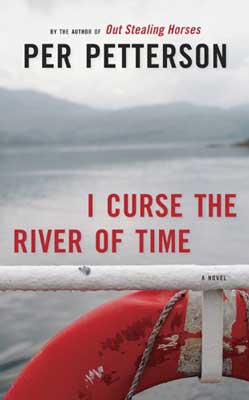
7. I Curse the River of Time by Per Petterson, translated by Charlotte Barslund
It’s 1989, and in Oslo, Arvid Jansen is having something of a mid-life crisis. He’s approaching forty, he’s about to get divorced, and his mother is dying of cancer.
When he goes to spend time with her, it’s apparent that she’s disappointed in him, and wishes to be left alone.
Arvid begins to think back on his life, searching through his memories to find when this rift between him and his mother began. His reflection takes him back through the years to his childhood and adolescence, to decisions he made that, while they were made to benefit society, went against his mother’s wishes.
Many readers will be more familiar with Petterson’s more popular book Out Stealing Horses. However, this topic is far more interesting to me.
As the only child of a single parent, Arvid’s relationship with his mother hits a very human parallel with my own. Plus, you’re unlikely to find many books set in Norway that cover Communism so directly. Amazon | Goodreads
Save Your Favorite Books On Norway For Later
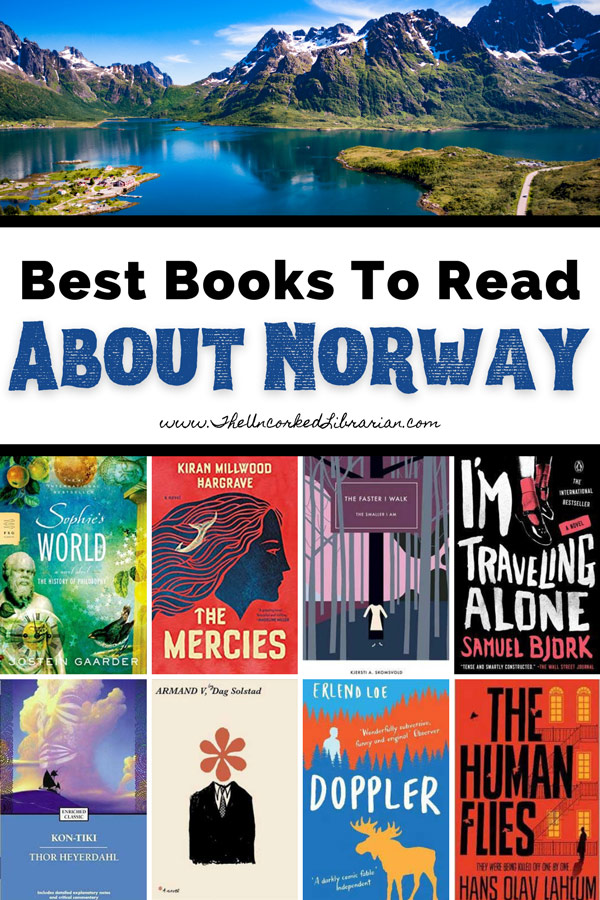
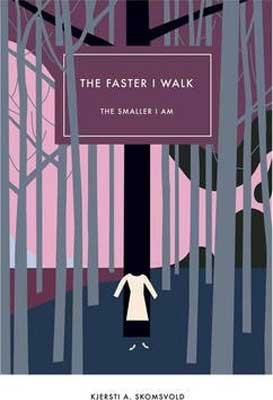
8. The Faster I Walk, the Smaller I Am by Kjersti Annesdatter Skomsvold, translated by Kerri A. Pierce
Mathea Martinsen has lived a long life. Or rather, she has been alive for a long time.
As she reads in the obituaries about so many people who have died at younger ages than she is now, she suddenly realizes that she may not have really “lived” at all.
Alarmed that she might die without anyone noticing that she was even here in the first place, Mathea decides that now is the time for action.
With her late husband’s watch, some sweet cakes and her old wedding dress, she heads out into the world to make her mark. Unfortunately, the world doesn’t seem to want to play along.
Plenty of people can relate to the concept of a life unlived, or of becoming too old and alone, especially in a place with such dark winters as Norway. Books like this, however, balance that dark subject matter with moments of humour and philosophical reflection.
It’s always satisfying to see a character grow as a person, especially if that character thought it might not be possible. Amazon | Goodreads
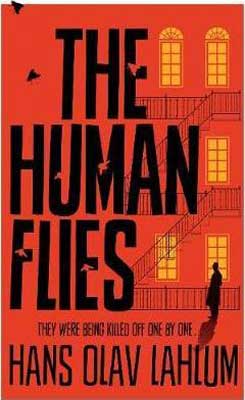
9. The Human Flies by Hans Olav Lahlum, translated by Kari Dickson
In Oslo, 1968, a man has been murdered in his apartment. Inspector Kolbjørn Kristiansen (known as K2) is called to the scene.
The victim is a wartime hero – Harald Olesen, a former member of the Resistance – someone, you would think, most people would not want to kill.
Teaming up with the brilliant, wheelchair-bound Patricia, the two begin to investigate the crime and all of the seemingly innocent neighbors of the deceased. But as they keep digging, it soon becomes apparent that the killer must be one of the residents of the apartment block.
But who would want Harald dead? And how did they manage to kill him when the door was locked from the inside?
Fans of Agatha Christie mysteries will enjoy this inventive crime procedural, which is the first in a series of Nordic noir novels from Lahlum.
Many people, in fact, hold it up as one of the best Scandinavian crime novels of recent years. Amazon | Goodreads
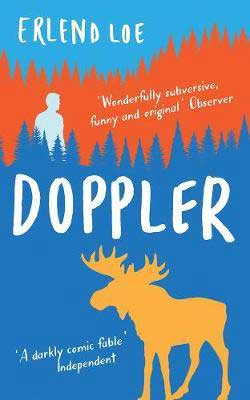
10. Doppler by Erlend Loe, translated by Don Bartlett and Don Shaw
Can’t a man just live alone with a moose in peace? That’s the only thing that Doppler wants, now that he’s escaped from his suffocating former existence. The answer is yes, but not without difficulties.
Following the death of his father, Doppler falls off his bike one day and decides to leave behind his job, his house, his pregnant wife, and their children, and go and live in a tent in the woods.
After he kills a moose for its meat, he finds that it had a calf. The two adopt each other and become friends.
Doppler spends much time bemoaning the egocentric consumerist society he has abandoned. As time goes by, it becomes increasingly hard to stay away from it.
Some novels about Norway don’t feel like they’re about Norway on the surface when in reality they very much are. This is one of those novels.
The subversive nature of this book – which in other hands could be a children’s book, a fairytale or a horror story – helps carry the reader through the tough and frustrating situations that Doppler finds himself in.
It’s both serious and fun at the same time. Amazon | Goodreads
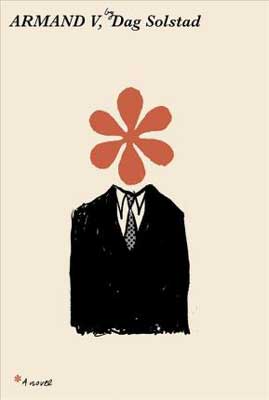
11. Armand V by Dag Solstad, translated by Steven T. Murray
Diplomat Armand spends his days walking a fine line between public duty and his own morality. On the outside, he must endorse wars being fought by his people on foreign soil. Inside, he detests the Western involvement in the Middle East conflict.
Fortunately, his mastery of words allows him to use linguistic skills to avoid getting himself into trouble.
But, nothing he can say can change the fact that his son has enlisted in the Norwegian SAS and gone off to fight, expressly against his father’s wishes. This can only end badly.
Unconventionally told entirely in footnotes to an unwritten book, this “novel” almost brazenly shows the reader its own artifice, taking them “behind the curtain” to see all the literary gears and cogs turning.
It’s a book, but it’s not a book – and it tells you it’s not a book.
And yet, everything feels entirely as it should be while you’re reading it – Solstad’s methods fit perfectly with the style he is trying to convey, making Armand V one of the best books on Norway available. Amazon | Goodreads
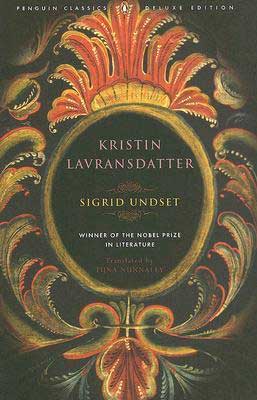
12. Kristin Lavransdatter by Sigrid Undset, translated by Tiina Nunnally
This historical saga is set in 14th-century Norway, and follows the exploits in the life of the wilful and passionate Kristin Lavransdatter.
Born into a kind and well-respected farming family, Kristin grows up among family tragedy and religious devotion, rebelling every now and then in various ways.
After being sent to a Benedictine convent school, she meets the young yet devilish Erlend Nikulaussøn. Together they embark on a passionate life together.
As the years pass, Kristin bears and raises seven sons for Erlend. However, their marriage begins to deteriorate. They eventually become estranged, leading to even more tragedy.
Originally written as a trilogy in the 1920s, which contributed to Undset’s winning of the Nobel Prize for Literature, Nunnally’s 2005 translation into English combines the three Norwegian books into one complete narrative. Amazon | Goodreads
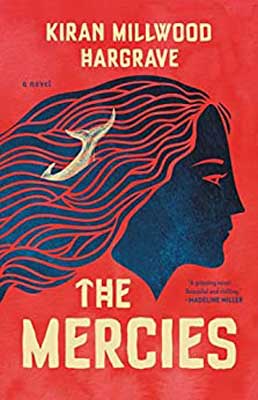
13. The Mercies by Kiran Millwood Hargrave
On Christmas Eve 1617 a ferocious storm swallowed up 40 men, nearly all the adult men of the small Norwegian village of Vardø. Maren Bergensdatter watches in horror as her brother, father, and fiancé disappear into the sea.
Three years later the women of Vardø have learned to take care of themselves. But the King believes they need male supervision and sends witch hunter Absalom Cornet to oversee the village.
Absalom arrives with his wife Ursa to give the women of Vardø some much-needed male leadership. From there it descends into a witch hunt as only some of the women fall in line with Absalom’s biblical rule.
Bit controversial as I hated this book, but I am firmly in the minority, so I hold up my hands and concede defeat.
The Mercies is undeniably beautifully written (if not over indulgently so at times), and I so wanted to love it. I just felt it was lacking.
But if you’re looking for historical fiction books about Norway and this premise sounds fascinating to you, I recommend completely ignoring me and giving it a go.
You can also find The Mercies on our wickedly witchy reading list. Amazon | Goodreads
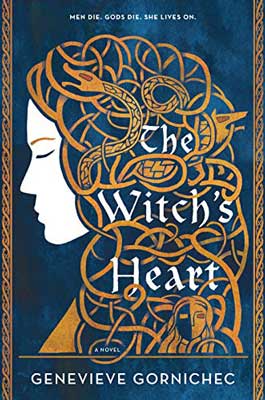
14. The Witch’s Heart by Genevieve Gornichec
As punishment for denying Odin seid, the ability to see the future, a powerful witch was set on fire.
But, she survived. Now, she lives in exile under a new name: Angrboda, away from the clutches of Asgard and Odin. Until one day the trickster god Loki tracks her down and befriends her.
Although most unexpectedly, the two fall in love, altering Angrboda’s life forever.
The Witch’s Heart isn’t necessarily a groundbreaking retelling. The feminist tale of the “mother of monsters” is a great entry into Norse mythology, and perfect for fans of the infamous trickster god. Amazon | Goodreads
Some of the easiest ways to grab these Norwegian books:
- Audible Plus: From Amazon, listen to Amazon Originals, podcasts, and audiobooks. They add new titles every week.
- Book of the Month: Get the month’s hottest new and upcoming titles from Book of the Month. You might snag an early release or debut author. Along with selecting a book a month, find terrific add-ons, both trendy and lesser-known titles.
- Amazon Prime Video – Stream thousands of ad-free movies and TV series on demand with Prime Video.
Thank you to TUL contributor, Dagney McKinney

Dagney (pronouns: any) is a neurodivergent writer who loves all things macabre and weird. She likes outrageously spicy food, long walks through graveyards, and historical tangents. You’ll most likely find her wandering around somewhere quiet or underground, buying salt, or whispering to camels.
What are your favorite Norwegian books?
Have you read any of these books about Norway? What is your favorite Norway book? Let us know in the comments!
Travel Across Europe Here:
Best Books Set In Iceland
Swiss Novels
Books About Italy To Take You There
Unique Books Set In Lithuania, Latvia, and Estonia
Top Spanish Books
Books Set In France
Travel To Greece With These Books
Swedish Books & Authors
All Europe Book Lists

Thanks for your book lists for travelers! As I share some of the same book lists as you on this and other countries, your site is bookmarked for future reference (future trips).
In return, I have three recommendations for Norway for you to consider:
Shadow on the Mountain by Margi Preus. Based on a true story, this juvenile novel follows the WWII Nazi resistance of a fourteen year old boy and his friends in Norway. I continue to be amazed by children’s participation in the resistance of their occupied countries – such bravery.
The Winter Fortress by Neal Bascomb. This extensively researched non-fiction tells the story of WWII’s Operation Gunnerside, the mission to prevent the Nazi regime from accessing deuterium oxide (heavy water) to complete their atomic bomb.
Snow Treasure by Marie McSwigan. This classic YA story follows a group of children who bravely outwitted the Nazi occupiers in extracting Norway’s hidden gold supply (approx. $9 million in gold bullion on skis in their rucksacks) to a ship which sent the treasure to America for safekeeping. Believed to be based on a true story, it was originally told by a Norwegian ship captain as he unloaded the cargo in Baltimore.
Thank you so much for sharing along with the thoughtful reviews. We appreciate it!